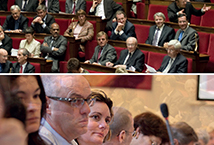- Home
- ESEC SCOPE
- Publications
- HOW SHOULD PUBLIC POLICIES BE DESIGNED TO SUPPORT CURRENT AND FUTURE TRANSITIONS?
HOW SHOULD PUBLIC POLICIES BE DESIGNED TO SUPPORT CURRENT AND FUTURE TRANSITIONS?
Visuel

Type of text :
Study
Type of referral :
Own initiative
Working group :
DELEGATION FOR FORWARD PLANNING AND PUBLIC POLICY EVALUATION
Date d'adoption
Date adopted : 11/24/2020
Rapporteur(s) :
Photo

Jean-Louis CABRESPINES
Photo

Fréderic GRIVOT
Overview
Présentation
For many years, our country’s democratic model has been questioned by citizens and political forces alike. This can be seen during elections, where turnout rates continue to fall due to a loss of confidence in political representatives, the economic and social crisis, growing inequality, the development of social and regional conflicts, increased migration, international tensions, the growing frequency of natural disasters, etc. Whether in economic or social matters, the balance is precarious and social and democratic achievements have been weakened, and may be destroyed or called into question.
In this context, public policies are entrusted to institutional actors, who are expected to anticipate current or future developments as part of a sustainable development model.
To do so, new models must be found that take into account the important changes, as the human factor is the main cause of irreversible damage to the environment, whose consequences could bring an end to our model of society.